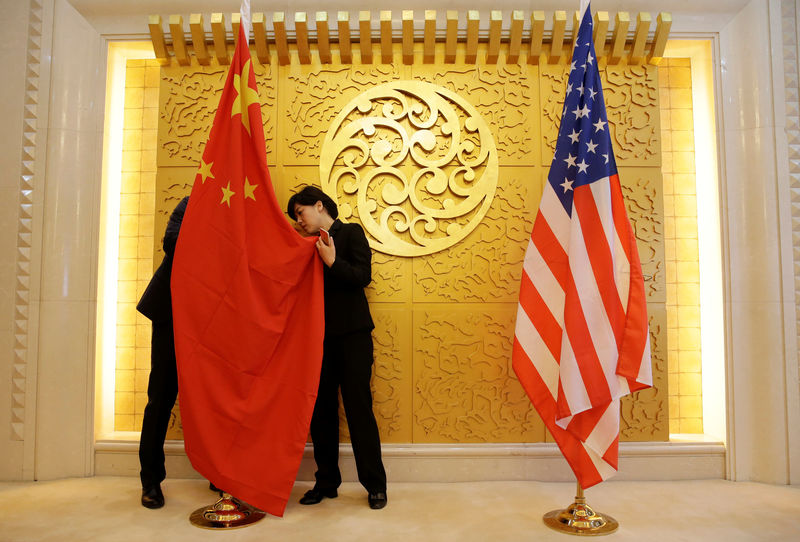 © Reuters. Staff members set up Chinese and U.S. flags for a meeting between Chinese Transport Minister Li Xiaopeng and U.S. Secretary of Transportation Elaine Chao in Beijing
© Reuters. Staff members set up Chinese and U.S. flags for a meeting between Chinese Transport Minister Li Xiaopeng and U.S. Secretary of Transportation Elaine Chao in BeijingBEIJING (Reuters) – Chinese President Xi Jinping’s top economic adviser, Vice Premier Liu He, will meet a top-level U.S. trade delegation in Beijing this week, state media said on Wednesday, amid a festering dispute between the world’s two largest economies.
U.S. President Donald Trump has threatened tariffs on up to $150 billion worth of Chinese goods to punish China over its joint-venture requirements and other policies the United States says force American companies to surrender their intellectual property to state-backed Chinese competitors.
China, which denies it coerces such technology transfers, has threatened retaliation in equal measure, including tariffs on U.S. soybeans and aircraft.
In a brief report, state media said China welcomed the delegation’s trip to Beijing, set for Thursday and Friday, adding that Liu would meet its members to “exchange views” on issues of mutual concern about Sino-U.S. trade and business ties.
It did not elaborate.
The U.S. visitors include Trade Representative Robert Lighthizer, Treasury Secretary Steven Mnuchin, Commerce Secretary Wilbur Ross, White House trade and manufacturing adviser Peter Navarro and new White House economic adviser Larry Kudlow.
China says it is determined to open its economy further to the outside world, and has denounced what it calls U.S. protectionism.
The talks needed some give-and-take, the official China Daily said in a Wednesday editorial.
“The time when China could be forced to open its doors is long past, and Beijing is not opening them wider now simply to appease others,” it said.
“If the U.S. delegation comes to China believing Beijing’s resolve to open wider to the outside world is a matter of expediency under pressure from Washington, it will likely mean a lot of time is wasted setting the record straight.”
Lighthizer said on Tuesday he was not looking to negotiate changes to China’s state-driven economic system in the talks, but would seek to expose it to more foreign competition.
Lighthizer told the U.S. Chamber of Commerce he viewed the talks as the start of a long learning process for Washington and Beijing to better manage their trade differences.
Earlier on Tuesday, Ross said Trump was prepared to levy tariffs on China if the delegation did not reach a negotiated settlement to reduce trade imbalances.
Speaking to CNBC television before traveling to China, Ross said he had “some hope” agreements could be reached to resolve the trade tensions between the two sides.
But Ross and Navarro, who spoke to steel company executives in Washington on Tuesday, both said any final decision would be made by U.S. President Donald Trump.
Lighthizer downplayed the potential imposition of tariffs on China in his remarks to the most powerful U.S. business lobby, which has opposed tariffs to try to force changes in China’s trade practices.
The so-called Section 301 investigation tariffs could be imposed sometime in June after the conclusion of a public comment process.
Fusion Media or anyone involved with Fusion Media will not accept any liability for loss or damage as a result of reliance on the information including data, quotes, charts and buy/sell signals contained within this website. Please be fully informed regarding the risks and costs associated with trading the financial markets, it is one of the riskiest investment forms possible.
Source: Investing.com



























